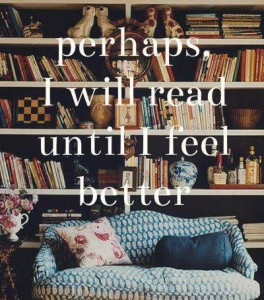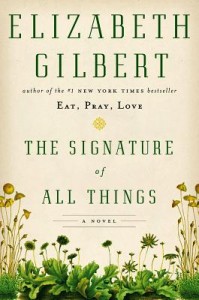Can Reading Make You Happier?
 You may remember that I read and reviewed The Novel Cure, wherein I discovered my perfect second-half-of-life career choice – Bibliotherapist.
You may remember that I read and reviewed The Novel Cure, wherein I discovered my perfect second-half-of-life career choice – Bibliotherapist.
Here’s a wonderful New Yorker article that delves further into this concept.
From the article:
Bibliotherapy is a very broad term for the ancient practice of encouraging reading for therapeutic effect. The first use of the term is usually dated to a jaunty 1916 article in The Atlantic Monthly, “A Literary Clinic.” In it, the author describes stumbling upon a “bibliopathic institute” run by an acquaintance, Bagster, in the basement of his church, from where he dispenses reading recommendations with healing value. “Bibliotherapy is…a new science,” Bagster explains. “A book may be a stimulant or a sedative or an irritant or a soporific. The point is that it must do something to you, and you ought to know what it is. A book may be of the nature of a soothing syrup or it may be of the nature of a mustard plaster.”
And then there’s this:
For all avid readers who have been self-medicating with great books their entire lives, it comes as no surprise that reading books can be good for your mental health and your relationships with others, but exactly why and how is now becoming clearer, thanks to new research on reading’s effects on the brain.
I haven’t secretly fist-pumped such information since they proved the scientific health benefits of a glass of red wine.
Turns out the authors of The Novel Cure (Berthoud and Elderkin) practice their Bibliotherapy through The School of Life, founded by one of my favorite authors, Alain de Bottom. His book The Art of Travel is a beautiful volume of essays to be carefully savored one delicious essay at a time.
So the Book Barmy Bibliotheraphy Practice doors are officially open.
Be my guinea pigs, send me your problem or issue either via comments or email — and I’ll recommend a book or two to help you get through it.
No charge.
Meanwhile, I’m in the middle of this – stay tuned…






